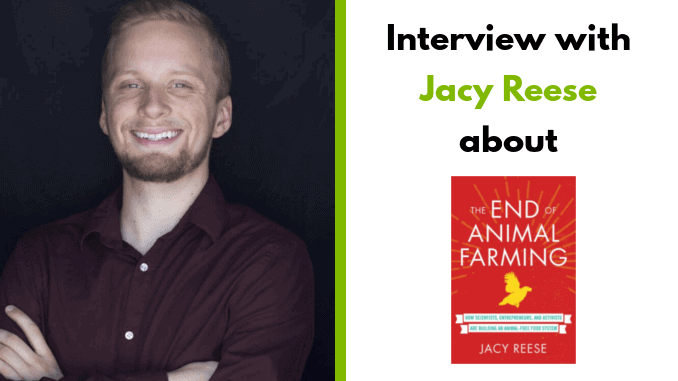
Jacy Reese is a writer, social scientist, and co-founder of the Sentience Institute. He has previously worked as a senior fellow at Sentience Politics, and as Chair of the board of directors for Animal Charity Evaluators. His work focuses on anti-speciesism, cellular agriculture, and on educating about factory farming. In 2017 Reece was recognized as one of Vice’s Humans of the Year.
In his recently released book, The End of Animal Farming, Reese analyses the social forces leading us toward the downfall of animal agriculture, the technology making this change possible and the activism around the world which is driving the ever-rising demand for plant-based products. He discusses what he calls “humanity’s expanding moral circle” and says that animal agriculture will come to an inevitable end.
We were very pleased that Jacy took the time to answer our questions about this crucial subject! The End of Animal Farming book is available now in Barnes and Noble, Beacon Press and Amazon.
Why should people in the meat business read your book?
Meat and animal agriculture might not be the same industry for much longer. People really like meat; they like the taste of it, and most of us grew up with burgers, steak, eggs, and plenty of other animal products. Most continue eating meat not because it comes from a slaughtered animal, but in spite of that. Humanity is coming to care more and more about animals, including not just cats and dogs in our homes, but also chickens and pigs. There’s also growing recognition of the urgency of climate change and animal agriculture’s contributions to environmental destruction. And in 2018, people are realizing that they can have a hearty, satisfying plant-based meal.
Entrepreneurs are starting companies that provide plant-based meat like the Impossible Burger and Beyond Burger that are near-indistinguishable from animal-based beef burgers. Scientists are racing to commercialize so-called “clean meat,” real meat made from animal cells without animal slaughter.
People in the meat business should read the book to get a sense of these coming changes, so they can stand on the right side of history.
You consider the end of animal farming one of the most important and transformational social movements of the coming decades. Please explain that for our readers.
Animal farming is a huge industry on many metrics: the number of animals used, environmental impact, economic costs. But social awareness of and outrage at the industry is still young.
This suggests that it’s a very neglected issue, but as more people take on this issue of the coming years, the farmed animal movement will be seen as more and more important and indeed urgent. Then, after the end of animal farming, humanity’s use of animals for food will be seen as a moral atrocity comparable to the worst crimes humans have committed against other humans like torture and genocide.

What are the social forces leading us to the downfall of animal agriculture?
Much of human history can be understood as an expanding moral circle. We transitioned from clans and villages to nation-states and today we’re still struggling to cooperate on a global scale. During this expansion across geographical distance, we’ve also had various human rights campaigns from the abolition of the transatlantic slave trade to protecting the interests of the mentally disabled. We’ve also started caring more about animals, and I would argue that farmed animals—who number over 100 billion—are the biggest frontier of the moral circle today.
This is in addition to social forces of increased concern for the environment and public health. Not to mention the force of the social movement coalescing against animal farming, due to increased social awareness like the outrage at undercover footage documenting the cruelty in animal factories and slaughterhouses. Made up of entrepreneurs, activists, politicians, scientists, and other do-gooders, this movement already has substantial momentum.
What technologies will make this change possible for the meat-hungry public?
The first approach is plant-based food science, meaning you take plant protein like wheat and plant fats like coconut oil and assemble them together in similar proportions and textures to what you’d find in a meat product. This is how products like the Impossible Burger are made, which actually has a “magic ingredient” called heme, which gives meat its beefy, bloody flavor. Instead of getting heme from red meat, Impossible Foods makes it with microorganisms like yeast using the same process that’s used to make synthetic insulin for diabetics.
The second approach has yet to hit markets, but nonprofit organizations and venture capital firms have been pouring millions into the production of those “clean meat” products. Food scientists take a small sample of cells from a living animal and mix them with sugar, nutrients, and growth factors to mimic the growth of muscle and fat inside an animal’s body. The end product is exactly the beef, sausage, or other meat products consumers want down to the molecular level.
Is the global activism driving consumer demand for plant-based foods unstoppable?
If I had to put a number on it, I would guess it’s over 90% likely that humanity stops eating animals at a large scale over the next century. It’s of course very difficult to predict any long-term social change with confidence. But even if this change is unstoppable, it is still very important for activists to work on this issue for two reasons. First, increasing the likelihood of change from something like 90% to 95% is still very important when trillions of lives are at stake. Second, speeding up this change by just a few years is still a matter of trillions of lives, human or animal.
You mention “humanity’s expanding moral circle” and say that humankind is becoming increasingly compassionate – do you have any data or evidence for this, other than the rise of veganism?
At the think tank I work for, Sentience Institute, we would like to run a survey at some point to quantify people’s moral circles. How much more do humans care about other humans close to them versus on the other side of the world? Humans versus dogs? Dogs versus pigs? Pigs versus insects?
But for now, there are some concrete examples of behavior and policy change: we obviously no longer use animals as much in sports, like Roman gladiators who fought animals or setting cats on fire as entertainment. We still abuse animals in much the same ways, but we are at least appalled at most public cruelty. Survey data also shows promising changes, like a 2015 Gallup poll where 32% of Americans said “animals deserve the exact same rights as people to be free from harm and exploitation”! 62% believed they deserve “some protection,” and only 3% thought they “don’t need much protection.”
The first poll we ran in 2017 when we founded Sentience Institute was on US attitudes towards animal farming and animal-free foods. It found that 54% of US adults said they were trying to eat fewer animal-based foods, 87% agreed with the statement, “Farmed animals have roughly the same ability to feel pain and discomfort as humans,” and an incredible 47% agreed with the radical statement, “I support a ban on slaughterhouses.”





